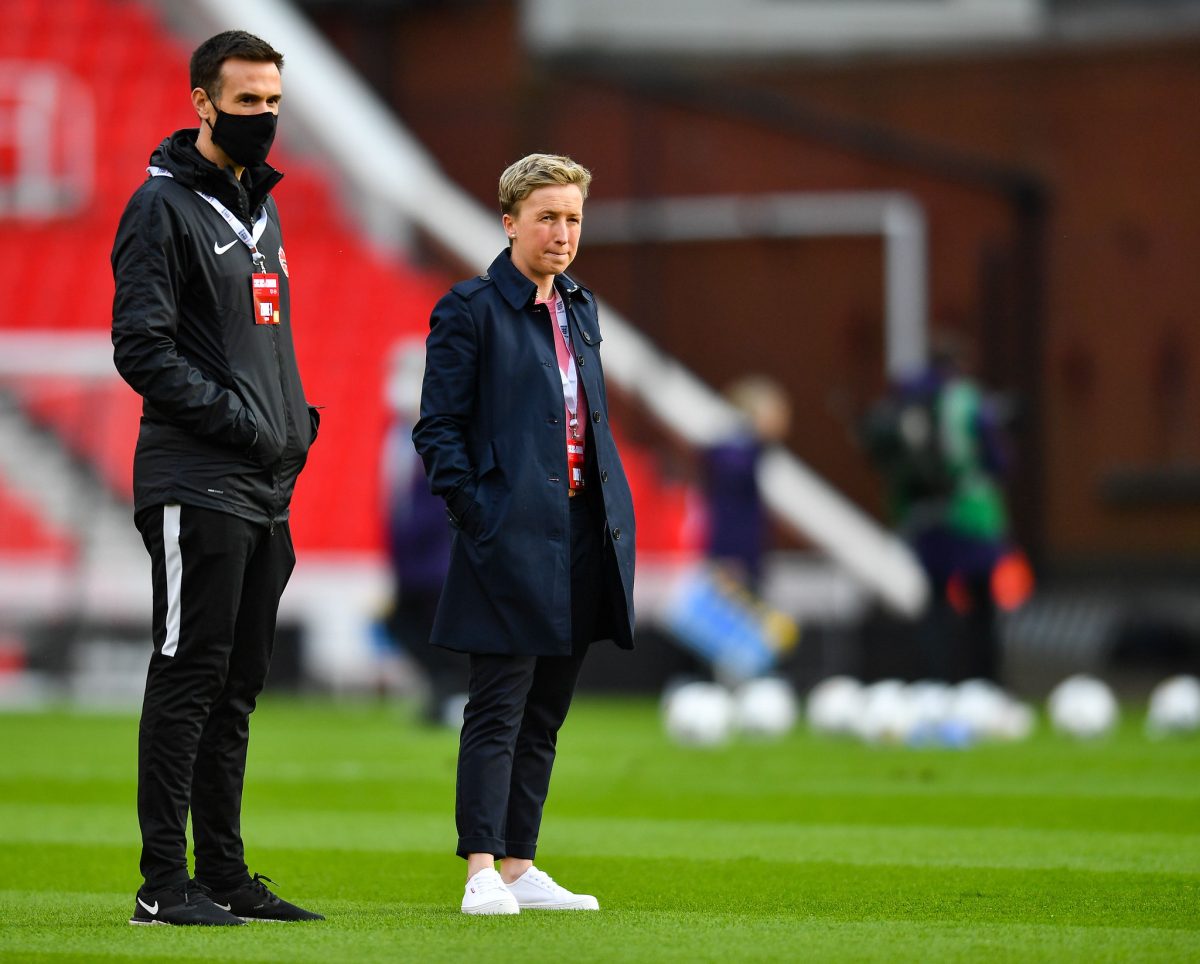It was October 2020 and Beverly Priestman was just made head coach of the CanWNT. She took over a team that had a disappointing 2019 FIFA Women’s World Cup, despite their highest-ever ranking before the FIFA Women’s World Cup began. The first big challenge for Priestman was the 2021 SheBelieves Cup.
Beverly Priestman: Her Influence in the CanWNT Winning Gold
Bev Priestman named Head Coach of Canada Soccer’s Women’s National Team
STORY 🍁 https://t.co/08O0t4A8Mc#CANWNT pic.twitter.com/WGfkMAaErg
— Canada Soccer (@CanadaSoccerEN) October 28, 2020
Beverly Priestman’s Childhood
Priestman came from a working-class town, and those values have been instilled in Priestman. There are one thing Priestman values that can be traced to her childhood. She said (source: John Molinaro of CBC News):
“Consett is working class. My mom and dad work very hard, not coming from privilege, so what they do have they worked hard their whole life for it,” Priestman told CBC Sports. “There’s a lot of values that come from where I’m from that even now I’m instilling in my players, namely, hard work. None of my players should be outworked.”
Priestman would later say that this ideology of hard work in Molinaro’s article came from her upbringing in Consett as that is what “stems from where I’m from.”
READ MORE: John Herdman: His Impact With the CanWNT
She got a lot of guidance from John Herdman on what it takes to have a coaching role. As revealed in Louise Taylor’s The Guardian article, Priestman took lessons in Brazilian futsal training in Consett. It was set up by then, a young lecturer and part-time head coach, Herdman.
She started her soccer career with the Everton Football Club before overseeing the New Zealand Football’s National Team for five years. During that time in New Zealand, she met her wife and former New Zealand midfielder, Emma Humphries. They ended up having a son, Jack, who was born in 2018.
England Assistant Coach and Also Canada U-20 and U-17 Head Coach
In 2013, Priestman took a job as head coach of the CanWNT youth teams. She also took the job of assistant coach with the Lionesses in England with the Athletic:
“When I went to England, I always said from Day 1 that I wanted to be a No. 1,” she told The Canadian Press. “And so, this is part of that jigsaw piece.”
WHAT A PERFORMANCE.
THE #Lionesses have taken us to the semi-finals of the @fifawwc! C’MONNNNNN! pic.twitter.com/RwrhAUZlaR
— Lionesses (@Lionesses) June 27, 2019
Unfortunately, for Priestman, things went sour after England’s impressive fourth-place finish in the 2019 FIFA Women’s World Cup. As a result, Phil Neville left the team and Sarah Wegner became the head coach of the Lionesses. This is what Priestman said about the move on the Women in Soccer show:
Priestman was not successful in becoming the head coach of the Lionesses. However, with many setbacks, there was an incredible opportunity and that was to become the Canadian women’s soccer head coach.
Beverly Priestman: CanWNT Head Coach (2020-Present)
Priestman became head coach back in 2020. This, however, did not mean she did not put pressure on herself and the players. This is what she said just when she recently became the head coach three years ago (source: John Molinaro, Director of Content):
This confidence and bravery were not lost with the heart of the CanWNT, Christine Sinclair. This is what she said about the Canadian women’s head coach (source: FIFA)
“Bev changed the attitude of this team,” said Christine Sinclair, who was enthused about her English coach as a motivator and tactician. “She instilled a sense of belief, of confidence, of bravery, we hadn’t seen before.”
What Priestman was putting into place could be seen in that SheBelieves Cup Game in 2022. One could see this against the USWNT, where they were the better team, but failed to take advantage of their scoring opportunities.
Obviously, the Olympics in Tokyo was delayed by a year, and nobody knew if Tokyo 2020 was going to take place because of COVID-19. However, it did happen in 2021 and Canada worked hard to earn a Gold medal in the Olympics.
Beverly Priestman: How She Took The Team to Olympic Gold
Priestman came into the Olympics as an underdog. With the improvement of the European teams and the well-known success of the USWNT, it was going to be a big challenge for the CanWNT.
The CanWNT was in a group with Japan, Great Britain, and Chile. They were all very close games when looking at the scoreline. However, with both Japan and Chile, Canada had most of the scoring opportunities. They even led late against Great Britain, until Great Britain got a fortunate deflection off Canadian Nichelle Prince. Canada would finish second in the group and advance to face Brazil.
The game against Brazil was one of significant importance. It was a very even game, as both teams had trouble generating scoring opportunities. However, the biggest reason for them winning that game was the goalkeeper, Stephanie Labbe, and the strong defence.
This forced the game to go to penalties, where Canada fell behind in penalties after Christine Sinclair’s miss. However, Canada converted four straight penalties, including a key one from Jessie Fleming to keep it close. After giving up the first three goals in the penalty shootout, Labbe made two big saves and Canada make their third-straight Olympic semi-finals appearance. This is what Priestman said about that Brazil game and why she thought the Gold Medal was coming to them as reported in the Nick Greenizan’s Saanich News article:
The Games Against the USWNT and Sweden
The USWNT game was a special game for the CanWNT. Vanessa Gilles was the star of the game, making several fantastic defensive tackles in the game. There was also Jessie Fleming, who converted a crucial penalty late to give Canada the lead.
To know what this meant for Canada, Sinclair, who appeared in her fourth Olympics in Tokyo 2020, said this (source: Meredith Cash).
“Almost felt like we’d won a gold medal right there because we had knocked the Americans out.”
This was the first time Canada beat the U.S. since 2001. It was certainly a huge achievement. However, they would now face the most impressive team, Sweden, who easily dispatched the USWNT in the group stage by a score of 3-0.
2020 Tokyo Summer Olympics Final
Before the final, Sweden won all five of their games without it needing to go to extra time. If Canada was to win Gold, their biggest obstacle was in the Summer Olympics Final.
It was in fact Sweden that struck first as Blacksstenius scored a first-half goal. This would not be the first time that Canada would fall behind. However, Christine Sinclair drew a penalty for her team, which was converted by Jessie Fleming.
Both teams had chances to win the game before extra time ended. In particular, Sweden had some big chances to score, but Stephanie Labbe once again stepped up for the national team.
Fans celebrate Canadian Women's epic gold medal win against Sweden in the soccer final 🥇 ⚽️ #OlympicMoments
Watch more Olympic Moments here: https://t.co/uyD5tl7d1l
Presented by @VisaCA pic.twitter.com/Dg2jQEgoO8
— CBC Olympics (@CBCOlympics) August 6, 2021
The penalties went back and forth as Caroline Seager had the chance to give Sweden their first-ever Olympic Gold Medal. Seager made Labbe go the other direction, however, fortunately for Canada, she missed the net. Deanne Rose and Julia Grosso converted penalties and as a result, Canada won their first-ever Olympic Gold Medal. This is what Sinclair said when being interviewed by Soccer North’s CBC Sports:
“I just remembered the goalkeeper punting the ball, and I like I got to get that.”
Beverly Priestman on the Influence of Coaching
Priestman talked about both Herdman and Neville and how their coaching philosophies influencer her as head coach of the Canadian women’s soccer team (source: Women’s Soccer Show).
READ MORE: John Herdman: How He Took the CanMNT to the FIFA World Cup
The CanWNT will now head to the 2023 FIFA Women’s World Cup looking to make a mark. Even though Canada finished in the top three in the Olympics three times, they never did so in the FIFA Women’s World Cup. The closest Canada came was in the 2003 FIFA Women’s World Cup where they finished fourth in the World Cup.
There are some problems for the Canadian women’s soccer team with injuries and also losing four of their last five games. Still, the CanWNT could still change things around as they lost two of their three games in the 2021 SheBelieves and have won two games against host Australia with Adriana Leon scoring all three goals in those two games last year.
Photo Credit: Will Palmer of Canada Soccer on April 13, 2021.






